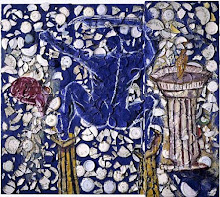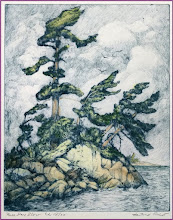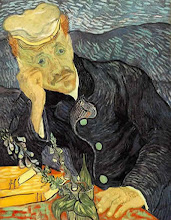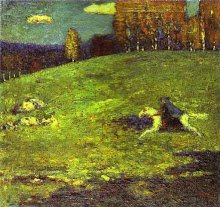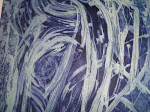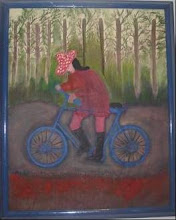“There are no words.”
Of all the comments on Facebook which
appeared in the days after Dr. Judith Eve Sandick—doctor, wife, mother of four
grown children, volunteer physician in Haiti and Pakistan, former Olympic-level
ski racer--took her own life, the ones that appeared the most, after “Sorry for
your loss,” and “Sending our thoughts and prayers” were, “There are no words.”
I should
know. I wrote them myself. Wrote them despite having been a professional writer
for most of my adult life. Wrote them despite having known Judy all my life,
known her longer than anyone else in the virtual or actual world, save for her
two siblings.
The last
time I saw Judy was four summers ago. She and her husband, David, drove down
from their home in Edgecombe, Maine to watch the World Cup finals at a bar in
Brunswick, Maine with me and my then-partner, Charlie. I can’t remember who was
playing—I’m not a soccer maven but Charlie, David and Judy were stoked up about
the match and I wanted to hang with all of them, but especially with Judy, whom
I hadn’t seen in over a year—and so we came up with this plan so that everyone
could get what he or she wanted, not an easy thing to accomplish in this life.
Judy was
in fine form that afternoon. Charlie and I got there first and saved Judy and
David seats. Gordon, Charlie’s Brunswick neighbor, an academic mucky-muck who
taught political science at Georgetown University, also sat with us, each seat
sporting a cup-holder and fold-out moveable tray so that you could drink your
beer and eat your nachos while watching the game, an agreeable way to pass a hot
July afternoon.
At half-time, we got another round of
drinks and Judy and Gordon got into a dust-up about health care. It was all
very good-humoured, even flirty; Judy had been a beauty in her youth, and she
was still, with her strong-boned face and athletic body, a woman of whom men took
notice. But Judy, who’d practiced emergency medicine for thirty years, who’d raced
down mountains all over the world before becoming an MD, wasn’t about to let
some policy wonk lecture her about the problems of Medicare for all.
I didn’t
say a word.
Part of me was appalled at Judy’s
chutzpah at taking on this guy she’d never met and the other part of me admired
the hell out of her. Judy had principles and she wasn’t about to abandon them
in the interests of making nice.
I’ve been in awe of Judy Sandick’s
chutzpah for most of my life.
We met in Mrs. Moore’s kindergarten at the
Berkshire Country Day School, and were inseparable for the next nine grades, both
of us spending a good deal of time in the hall for various infractions: talking
out of turn, not putting our books in our cubbies, failing to sit still. At
recess, our problems multiplied; we eschewed the girly-girls who stood around
comparing ruching on their dresses and played kickball with the boys, games
that would often end with Judy beating the crap out of some kid because he’d
accused her of throwing like a girl or seeing her underwear when she ran: “I
see England; I see France; I see Judy’s underpants.” Once, our fifth-grade teacher, Mr. Marks, had
to pick Judy up by the sash on the back of her dress and remove her from the
flailing body of some fleshy nerd she was pummeling. Judy spent rest of the day in the principal’s
office.
Today, we would be diagnosed with
Attention Deficit Hyperactivity Disorder, medicated with Ritalin and segregated
into “special” classes; back then, we were just trouble and everyone—from bus
drivers to substitute teachers—gave us a wide berth.
A trio of girls—together so much they made one
formidable social animal CandyMollyFran—hated us. In retaliation, we started our
own secret society, the Buddy-Buddy Club. We had secret handshakes, secret greetings,
secret meeting places; when we wrote one another letters, we put “The Buddy
Buddy Club” as our return address, as if we were some junior branch of The
Porcellian Club.
How can you have a club with two
members? my dad teased. Because, we said.
Looking back now, I can see that
there were signs, even then, that Judy suffered from depression. My father’s
mother lived within walking distance of Judy’s house on Spadina Parkway in
Pittsfield and Judy would often walk over to meet me when I was visiting. My
grandmother, who came from a family of seven and loved to regale us with tales
of her childhood, would often drive us to the Howard Johnson’s on Route 7 for afternoon
treats of banana splits. Judy would sit in the back seat, as grim as if she
were trapped in the principal’s office. Fiddling with the sugar as we waited
for our food, Judy would continue to give us the silent treatment until my
grandmother would smile and say “Judy, why do you scowl so?” Judy's face would get all red and scrunched up and I could
tell she was about to cry.
When we were teenagers, Judy invited
me to France to attend a week-long ski training camp in the French Alps,
followed by a trip around Europe in a van with several other ski racers. Judy
didn’t say a word for an entire week. At the time, I thought it odd, even
irritating—I was the only one who wasn’t a competitive skier, and would have
appreciated some verbal checking-in--but the others knew that the best
thing was to let Judy be. And hope that her mood, like days of fog on Mont
Blanc, would pass. By the time Judy and I split off from the others, spending a
night in Grenoble before we flew home, she was back to her zany self. We spent
our last night gorging on French pastries and gossiping.
“Judy was always hardest on herself,”
a fellow ski racer wrote on Facebook.
Of course, I thought. Judy was hardest on herself. Which is why she
drove herself to homeschool her four kids while sailing with her family around
the world. Which is why she worked double shifts in the emergency room at Miles
Memorial Hospital to support her family when they returned to Maine, working even
on Christmas. Which is why she went back to school in her fifties to complete a
Master’s in Public Health so that she would be qualified to work as a doctor in
third-world countries. Which is why, when she couldn’t shake the old, dark feeling
of being unworthy, she couldn’t let it go, couldn’t forgive herself.
“Sorry I haven’t been in touch,” she would write
in an e-mail or text, as we tried to get together in Maine, where Charlie had
retired, or Massachusetts, where I still lived and worked. When my relationship with Charlie ended, I intended to tell Judy, explain why I was now the one who hadn’t
kept up. But like Judy, I was hard on myself, felt humiliated to have failed at
another relationship. Widowed, divorced, single again—“You could check
every box on your tax return,” Judy had once joked--I felt like a loser.
“I’m sorry I wasn’t a better friend
to her,” I wrote to David in a private message on Facebook. “I should have seen
the signs, should have worked harder to stay in touch. I was too wrapped up in
my own shit.”
In Judy’s obituary, which David and
their four children wrote together, mourners are asked not to send flowers but to
hug their loved ones.
It’s a singular request: my arms ache
from trying to honour it.
***
All posts copyright© 2019. All rights reserved. No part of this blog may be reproduced or distributed without attribution and/or permission of the author
-->
